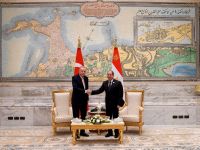Talk of war and worries about the impact of last week's terror attacks in the United States weighed heavily on Wall Street Wednesday, September 19, sending European share markets lower as well.
US share prices took a nose dive in mid-afternoon trading, with the Dow Jones Industrial Average plunging 423 points into negative territory. But the Dow late in the session staged a striking turnaround, climbing back to 8,759.13, down just 144.27 points or 1.59 percent at the close of the day. The Nasdaq electronic exchange also closed lower at 1,527.66, down 27.42 points or 1.74 percent.
The turnaround in sentiment appeared to coincide with reports from the Pentagon that the United States had begun to re-position forces ahead of what is widely expected to be a military operation to stamp out global terrorism.
Throughout much of the session, however, investors were hesitant to buy stocks at a time when the full effect of last week's devastating terrorist attacks on the global economy had yet to be determined.
The operation, in which hijackers commandeered US commercial airlines and then flew them into targets in New York and Washington, has dealt a crippling blow to the airline and tourism industries and is expected to cut deeply into auto sales.
"Make no mistake about it," President George W. Bush told reporters. "This has affected our economy in a big way." Commenting on Wednesday's session, Morgan Stanley senior trader Michael Lyons said: "There's a lot of war talk. There's no doubt about it. There's a sense that we're not going to get a lot of warning when war breaks out. This has everyone nervous."
In Europe the mid-afternoon fall on Wall Street sent share prices heading lower. In London, the FTSE 100 index lost 2.62 percent to finish at 4,721.7 points, while Paris the CAC 40 index dipped 2.05 percent to 3,888.93 points. The Frankfurt DAX 30 index dropped 3.65 percent to 4,041.8 points. At the time most European stock markets closed the Dow Jones index was down 2.39 percent while the tech-heavy Nasdaq index shed 3.25 percent.
European investors likewise remained nervous about prospects for US military retaliation for last week's terrorist attacks on New York and Washington. Afghanistan's ruling Taliban signaled Wednesday it would sooner face a military onslaught than surrender Usama Bin Ladin, as Washington began assembling an international coalition to go after the man it says is the prime suspect.
But in Europe trading did appear to be returning to normal, albeit in unusual circumstances. "We're seeing very much business as usual," said Robert Kerr, a European strategist at Bank of America. "We're not detecting any particular constraints on people's activities," he told AFP. "We're seeing buying activity as well — we're seeing business both ways."
In the United States, macroeconomic factors depressed sentiment. The Federal Reserve's latest edition of its Beige Book survey found that the economy remained sluggish through early September — even before last Tuesday's attacks — and was showing no sign of an imminent turnaround. Weakness was also evident in the July trade deficit, which showed declines in both imports and exports. ― (AFP, New York)
© Agence France Presse 2001
© 2001 Mena Report (www.menareport.com)







